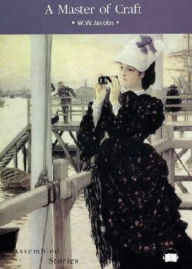W. W. Jacobs
William Wymark Jacobs (8 September 1863 – 1 September 1943) was an English author of mainly comic fiction. He wrote occasional horror stories and is best remembered for The Monkey's Paw. He was born in Wapping, London on 8 September 1863, the son o
... Read more
William Wymark Jacobs (8 September 1863 – 1 September 1943) was an English author of mainly comic fiction. He wrote occasional horror stories and is best remembered for The Monkey's Paw. He was born in Wapping, London on 8 September 1863, the son of William Gage Jacobs and his wife Sophia, née Wymark. His father managed the South Devon wharf at Lower East. William and his siblings were still young when their mother died. Their father then married his housekeeper and had seven children with her. Jacobs attended a private London school and then Birkbeck College (Birkbeck Literary and Scientific Institution, now part of the University of London), where he made friends with William Pett Ridgcap
Jacobs is remembered for a macabre tale, The Monkey's Paw, (published 1902 in a short-story collection, The Lady of the Barge) and several other ghost stories, including The Toll House (from the 1909 collection Sailors' Knots) and Jerry Bundler (from the 1901 Light Freights). Most of his work was humorous. His favourite subject was marine life – "men who go down to the sea in ships of moderate tonnage," said Punch, reviewing his first collection, Many Cargoes, which gained popular success on publication in 1896.
Michael Sadleir has said of Jacobs' fiction, "He wrote stories of three kinds: describing the misadventures of sailor-men ashore; celebrating the artful dodger of a slow-witted village; and tales of the macabre."
Jacobs's short-story output declined somewhat around the time of the First World War. His literary efforts thereafter were mainly adaptations of his own short stories for the stage. His first stage work, The Ghost of Jerry Bundler, opened in London in 1899, was revived in 1902, and was eventually published in 1908. He wrote 18 plays altogether, some in collaboration.
W. W. Jacobs died on 1 September 1943 at Hornsey Lane, Islington, London, at the age of 79. An obituary in The Times (2 September 1943) described him as "Quiet, gentle and modest... not fond of large functions and crowds." Ian Hay remarked, "He invented an entirely new form of humorous narrative. Its outstanding characteristics were compression and understatement."
Less































